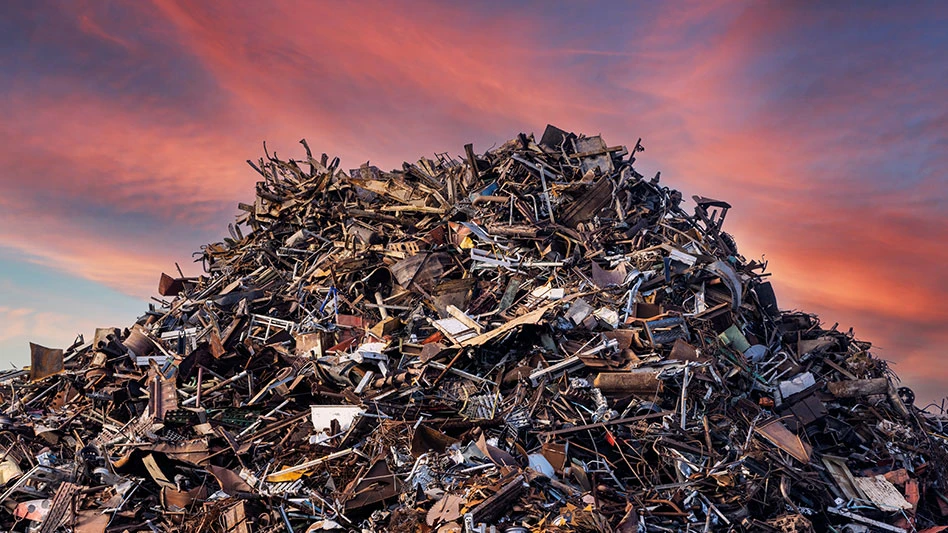Fear is not in the game plan for recycling companies making capital investments to build their businesses for the next upswing.
Noah may have been the ultimate contrarian. As described in the Old Testament, the divinely informed Noah built a massive ship on dry land during weather conditions that inspired none of his more "rational" neighbors to follow suit.
Bill Cosby once performed a routine based on the ribbing Noah must have taken from neighbors while building the famed ark. But one massive flood later, Noah’s bold stance had proven to be the wise one, and his willingness to go against the crowd had paid off.
The challenges facing recyclers may not be a disaster of Biblical proportions, but a flood of tough times has indeed swept over the industry.
Not all recyclers are putting up a "no solicitors" sign and hiding their checkbooks, however. In fact, quite a few are taking advantage of slower processing schedules to make capital investments that have been put off for the past several years.
Taking a Breather
Downtime is a dirty word to a manufacturer with a backlog of orders to fill. Through much of the 1990s, scrap metal and paper recyclers were processing high volumes of material, whether per ton prices were high or low.
The good news for recyclers was that they were busy, and the additional volume (ideally) translated to additional revenue—especially when prices were high enough to create a good margin.
The downside was the pain inflicted with each occurrence of equipment downtime. When volume is high, processors see inventory piling up and opportunities lost with each hour that passes when a shredder, baler or other piece of equipment is not operating. They also see a hole being dug that will be difficult to climb out of once equipment revs back up.
This can make it especially tough to schedule a new equipment installation, where production could be disrupted not for one or two hours, but for as much as one or two weeks. "Putting in equipment is very disruptive," says Richard Harris, sales director for the MacPresse line of balers carried by Sierra International Machinery Inc., Bakersfield, Calif. "Being down for one or two weeks is a major hassle."
Even doing the necessary homework to research equipment and meet with sales representatives can be difficult when all energy is being directed toward keeping the production schedule ramped up.
When the markets are at their peaks, "a lot of people don’t give us the time to go through our sales presentations," notes Joe Szany, sales manager of American Baler Co., Bellevue, Ohio.
Adds Pieter Eenkema van Dijk, president of Van Dyk Baler Co., Stamford, Conn., "We see the more sophisticated customers buy when conditions are slow, because they have time to spend on things like research and installations. And then when markets are good, you don’t hear so much from them because they’re at maximum production."
"Because markets have been down, it has been helping us find the time to review with our customers the efficiencies we can offer," Sierra’s Harris remarks. "People tend to listen more when times are tough, but when they are good they may not pay as much attention to costs and overhead."
Bill Tigner, vice president and general manager of Metso Svedala Recycling, Cedar Rapids, Iowa, notes that a recent shredder purchaser was finally able to make the decision to purchase this year as the flow of material slowed down. "One of my customers who pulled the trigger earlier this year went through a year-and-a-half decision process," he remarks.
Buy When it's Quiet
The year 2000 started with the same hectic conditions that were in place during the 1990s, but by the end of the year plummeting prices started to be matched by decreased volumes. In 2001, recyclers have seen less inventory coming in the door and weaker orders for material.
One might think the soft market would be matched by a soft demand for new processing equipment, but some equipment manufacturers say that is not necessarily the case. "Equipment sales have never correlated to scrap prices," says Tigner. "Back when I was selling shears in the early 1980s, it was a down market and we sold a tremendous number of shears," he recalls.
"I think a lot of companies go ahead and make investments, not when they’re ‘blowing and going’ and making money—they don’t want to shut down then—but rather when they don’t have customers lining up to bring material," Tigner remarks. "During the slower time, they can say, ‘Hey, let’s switch out now.’"
Szany also finds customers on the paper recycling side of the industry using the same reasoning. "When it’s slower, they have a lot of time to work the bugs out and train their operators more effectively on the equipment," he says. "There are not the same production pressures when they are not running at 110% of capacity. You can put the machine in and afford to learn how to use it."
Some recyclers will also use the mentality that puts savvy car buyers in dealer showrooms during a recession, notes Szany. "From the customer point of view, some take the belief that when things are bad, that’s the best time to make a deal," he comments.
But if a market slowdown offers time to install new equipment, it also creates doubts in the minds of business owners and managers as to whether a company can compete through the tough times and make it to the next growth period.
"There has to be a certain level of confidence in the markets you sell to," acknowledges Scott Williams, vice president of sales and marketing, Harris Press & Shear, Peachtree City, Ga.
While the woes of high-profile steelmakers such as LTV Corp. and Bethlehem Steel are a cause for concern for ferrous markets on the one hand, the continuing ability of scrap-melting electric arc furnace (EAF) steelmakers to gain market share provides a positive contrast.
The trend is one reason Harris started its Harris Shredders division in 1999, says Williams. "What has driven our move into shredders is the growth of EAFs and their need for shred," he remarks. "Worldwide and national demand for shred should grow as EAFs grow as a percentage of the steel industry, and as much as 50% of what EAFs want to melt could be shredded scrap."
One Shift, One Machine
There could be several reasons why a recycler buys a new piece of equipment, but one of the keys that equipment sales people zero in on is efficiency.
Whether incoming volume is high or low, it is tough to argue against efficiency if that is defined as processing the most tonnage in the least amount of time.
Van Dijk notes that one recent buyer of a large Bollegraaf baler model has been able to use the machine not only to do the work of two smaller balers, but to do so in five twelve hour shifts per week as opposed to running around the clock seven days a week. Plus the Bollegraaf is able to run without a dedicated operator, further saving on labor costs.
"The machine needs no operator and has much lower energy costs," says van Dijk. "So they save on the order of $7,000 to $8,000 per month in electricity. That alone almost pays for the baler. Then you have the labor savings with half the time of before, so that’s just gravy. So the machine that looks like an expensive cost up front is actually saving money right away."
American Baler Co. uses similar logic when presenting the cost-effectiveness of owning a new machine. Listing the five leading costs of owning a baler (capital costs or payments, energy, con-sumables such as baler wire, labor costs, and maintenance), Szany says capital costs are likely to be the second lowest.
On older machines, maintenance costs especially can escalate quickly to surpass the potential cost of payments on a new machine. "Maintenance costs over the life of a machine rise as the machine ages," says Szany. "On a graph, you can see the point where those costs begin to surpass the combined cost of a new machine with lower maintenance costs."
While many recyclers do not want to appear harsh in mentioning it, saving on labor costs is also attractive. "Whenever companies can put equipment in place to save labor, they will do it," states van Dijk. "Labor costs will always go up, while equipment is written off after five years."
The desire to own machines that are smarter is also causing recyclers to pull the trigger on new equipment purchases. IPS Balers, Baxley, Ga., is among the companies equipping new units with management reporting systems. "This system provides the baler owner with a report that basically gives them all the pertinent information for a given time period: the number of bales, bale weights, the amount of electricity they used, the amount of wire," says Sidney Wildes of IPS. "We call it the Smart Report, and it allows managers to really see how efficiently they are running."
Such systems are beginning to appear on several different brands of balers, and Texas Shredder Inc., San Antonio, is among the shredder companies offering a similar system to accompany its metals shredding plants.
Some software vendors are seeing their orders increase this year for the same reasons as equipment makers. "For us, it’s been very encouraging in the last three months," says Mike Recalis, CEO of scrap inventory management software creator Mayer Information Technologies, Markham, Ontario, Canada. "We’ve sewn up a number of sales. People are now not just looking at ways to improve their systems, but they’re actually taking the steps to do it."
Loss control considerations can come into play when buying both inventory control software such as that designed by Mayer, or when purchasing equipment with monitoring systems.
"Unfortunately, there are situations where employees can take advantage of a situation and theft of commodities does occur," says Harris. "But with systems like the ones that we offer that generate management reports, each shift and each grade produced on that shift can be tracked."
A combination of low interest rates, federal and state capital spending tax incentives, and even estate planning strategies have also been pushing recyclers toward making equipment purchases in 2001 or 2002. Harris has introduced a number of financing options for its customers, says Williams, "The level of interest we’ve seen since we announced the creation of Harris Financial Services in October has been terrific," he comments.
Not all equipment makers sell on the same strengths. Some can win on price, others on tons processed per hour, and others on a cost per ton formula. But all agree that their customers want to remain competitive, and that they see the current slowdown environment as a time to do some strategizing.
"Initially, an equipment sales person might hear, ‘I can’t buy this; I can’t afford it," says Sierra’s Harris. "But they’re also saying, ‘I’ve got to be competitive. I’ve got to decrease my overhead.’ We’re seeing a number of current sales and a great deal of potential by going in and replacing old, inefficient equipment with high-volume equipment that brings down the cost per ton processed."
The author is editor of Recycling Today and can be contacted via e-mail at btaylor@RecyclingToday.com.

Explore the December 2001 Issue
Check out more from this issue and find your next story to read.
Latest from Recycling Today
- Altilium produces EV battery cells using recycled materials
- Brightmark enters subsidiaries of Indiana recycling facility into Chapter 11
- Freepoint Eco-Systems receives $50M loan for plastics recycling facility
- PET thermoform recycling the focus of new NAPCOR white paper
- Steel Dynamics cites favorable conditions in Q1
- Hydro starts up construction in Spain
- Green Cubes unveils forklift battery line
- Rebar association points to trade turmoil





